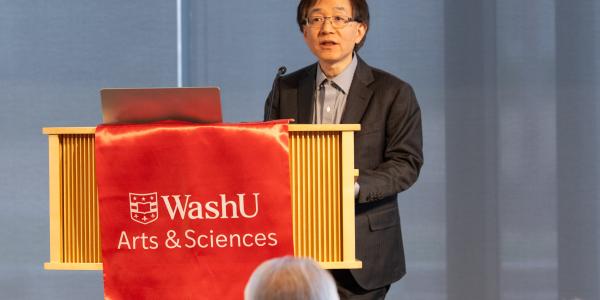Earlier this spring, Arts & Sciences launched a new internal grant program, “Seeding Projects for Enabling Excellence & Distinction” (SPEED), with the goal of spurring novel and impactful research, scholarship, and creative practice initiatives led by tenure-track and research faculty. SPEED grants of up to $50,000 will be awarded semiannually to support the exploration and development of new scholarly and creative pathways. With guidance and input from the Faculty Board of Research, Feng Sheng Hu, dean of Arts & Sciences, and William Tolman, vice dean of research and entrepreneurship, recently named the first cohort of SPEED grant winners.
“The breadth, depth, and quality of the proposals we received was quite impressive,” said Feng Sheng Hu, dean of Arts & Sciences. “Empowering faculty to pursue bold, innovative, and collaborative ideas is a central aim of our strategic plan, and it is critical to strengthening our research enterprise. I’m incredibly excited to watch these projects take shape.”
The winners represent disciplines across Arts & Sciences, from film and media studies to anthropology to biostatistics. Funding for these innovative projects begins June 1 and will last one year, with expectations that the work will lead to external grant submissions, scholarly publications, or significant presentations or events.
Enabling antibiotic discovery via actinobacterial contact-dependent growth on newly engineered materials surfaces
Joshua Blodgett, assistant professor of biology, Arpita Bose, associate professor of biology, and Mark Meacham, assistant professor of mechanical engineering and materials science in McKelvey, will collaborate to develop and apply flow cell devices that promote controlled growth of a group of antibiotic-producing, soil-borne microorganisms known as actinomycetes. The team's findings could eventually help improve processes for developing new antibiotics to treat resistant infections.
Parasitic disease and intestinal inflammation in low-resource U.S. regions: Infection patterns and community-based outreach strategies
Theresa Gildner, assistant professor of biological anthropology, will investigate how environmental conditions and associated pathogen exposures contribute to long-term health inequities in low-resource regions in the United States. Gildner’s project will integrate perspectives from anthropology, microbiology, community stakeholders, and healthcare workers to collect data on current infection patterns in underserved areas, develop resources to address persistent health inequities, and help identify new prevention strategies.
Big Apple 80s: An augmented reality trip to the birth of MTV
Elizabeth Hunter, assistant professor of drama, will develop Big Apple 80s, an augmented reality (AR) application for mobile phones based on locations related to the early years of the Music Television (MTV) cable channel. Hunter will collaborate with St. Louis’ Missouri History Museum and New York City’s Museum of the Moving Image (MoMI) to create an immersive, interactive experience that will allow her to explore how emergent technologies like virtual reality (VR) and AR disrupt familiar notions of liveness, presence, and authenticity.
Asia in St. Louis: An interactive mobile application for public outreach
Uluğ Kuzuoğlu, assistant professor of history, will promote public outreach with digital humanities through his Asia in St. Louis (ASTL) interactive mobile application. ASTL will offer St. Louisans a way to interact with the forgotten Asian history of the city, guiding users to spaces where Asia-related events have taken place and helping them discover unique “archival finds,” with the goal of bringing Asian American stories back into public memory. Kuzuoğlu is developing ASTL in collaboration with Ethan Schaefer, a postdoctoral fellow in the Fossett Laboratory for Virtual and Planetary Exploration.
Using machine learning to optimize interventions for parents of children with epilepsy
Nan Lin, professor of mathematics and biostatistics, will collaborate with Liu Lin Thio, professor of neurology, neuroscience, and pediatrics, and Michael Gemmell, pediatric clinical research coordinator at the School of Medicine, to investigate the underlying factors that contribute most to a predisposition for mental illness in parents of children with epilepsy. The team will use retrospective clinical data to develop multiple predictive models for behavioral health outcomes and analyze the accuracy of these models against prospective clinical data. Lin will also use these models to assess which factors are the most predictive of behavioral health outcomes.
Nutrition during gestation and postnatal milk composition and infant brain development: Observational studies of postnatal brain growth following a prenatal evolutionary nutrition trial
E.A. Quinn, associate professor of biological anthropology, will conduct observational studies of postnatal brain growth following a prenatal evolutionary nutrition trial. In collaboration with Lora Iannotti, associate professor at the Brown School, Quinn will study human infant brain development and its relationship to milk composition with particular attention to the association between whole foods identified from the archaeological record, changes to neurotrophic factors (biomolecules that support developing and mature neurons) and specific nutrients in human milk, and infant brain development.
First steps toward building a topological quantum computer with the newly discovered spin triplet superconductor UTe2: Characterization of the order parameter with Josephson Interferometry
Sheng Ran, assistant professor of physics, and Kater Murch, professor of physics, will take the first steps toward building a topological quantum computer with the newly discovered spin triplet superconductor, UTe2. Ran and Murch will use Josephson interferometry to deepen their understanding of spin triplet superconductivity, which forms the basis for future quantum computing technologies, including the eventual realization of fault-free quantum computation. They will also establish capability to fabricate and control Josephson junction-based spin triplet pairing.
Between injury and community: Interdisciplinary interventions into gendered media experiences
Rebecca Wanzo, professor and chair of women, gender, and sexuality studies; Renee Thompson, associate professor of psychological and brain sciences; Reem Hilu, assistant professor of film and media studies; Raven Maragh-Lloyd, assistant professor of African and African American studies and of film and media studies; and Alison Tuck, a university fellow in psychological and brain sciences; will host a two-day symposium on interdisciplinary interventions into gendered media experiences. Participants will leverage their expertise in psychology, feminist science studies, sociology, law, media history, communication studies, and industry to address questions related to social support systems across social media, the relationship vulnerable populations have to media, and how interdisciplinary collaboration can transform how scholars approach media. Their findings will be made available to the public via a website and published in a special issue of the peer-reviewed journal Feminist Media Histories.





